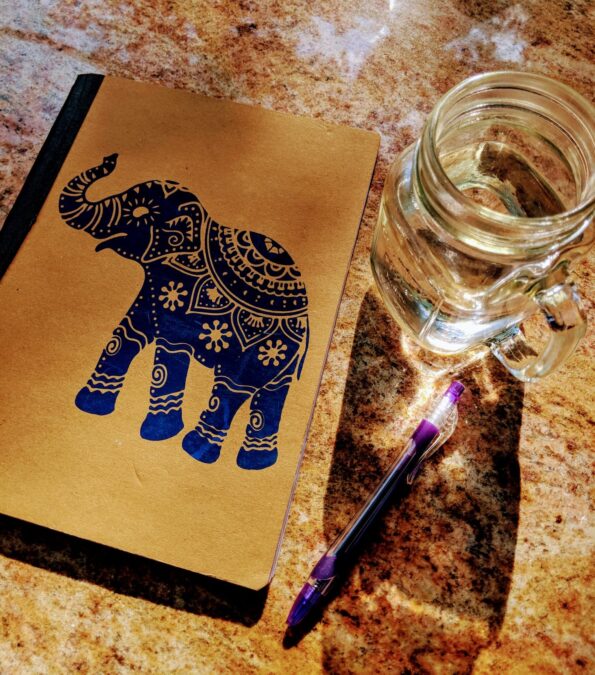When I was little, I received a gift. A pink diary that locked with a tiny key. I remember how excited I was to start writing in it. First, I analyzed the lock to see if it was brother-proof. After all, I didn’t want my secrets getting into the wrong hands! I lined up the right pencils, with erasers, just in case I changed my mind. Then, I’d sit with it for ages and agonize over what to say because I didn’t want to write the wrong thing. However, once I began there was no stopping me.
Discovering a love of writing
What happened next was an addiction that lasted all through grade school when I mostly wrote about vacations, what we did in the summer, who I played with, or who was mean to me. By high school, that little pink diary had long since been replaced by fancy diaries with lined, dated pages and a habit of jotting down the day’s events. A class assignment in creative writing forever changed my diary into full-fledged journaling and a love of writing in general. This is how I learned the power behind journaling.
The assignment that changed it all
The assignment: “Write about your week but write as if no one will ever read it.”
Sounds simple but my mind was blown! I had never written like that. I always wrote with caution just in case someone read what I wrote. But the thought of writing freely with no chance of scrutiny or judgment was a game-changer. With that one shift in mindset, I suddenly viewed my journal as a private, safe space to be honest with myself to examine feelings and express emotions. The pen flowed.
How a blank page can be a healing tool
The second part of the class assignment was to actually read your journal privately once a week. What a fantastic way to get to know yourself!
I discovered and explored my own opinions, ideas, and points of view.
It didn’t take me long to realize that I had begun to use the journal to vent frustration and anxiety over my parents getting divorced. Because I wrote regularly, I had learned to express my feelings instead of repressing them. I learned to weigh the pros and cons before making decisions and to problem-solve. I was only 15 years old but through writing, I had learned valuable coping mechanisms that would serve me throughout my life. My journal became self-prescribed therapy and got me through some hard times while giving me a platform to envision my future and make plans.
Reflection and regret
In my early twenties, my oldest childhood friend and I used to pull out my old diaries and laugh and laugh at things that we had done. Sometimes, I’d pull them out to reflect on who I had been and who I had become. By the time I met my husband, I had a small trunk of diaries and journals. Now, one of my biggest regrets is that I threw most of my diaries away. I thought I didn’t need them anymore. I was wrong.
Reaching for my old confidant in a time of need
When I suddenly became ill in my mid-thirties, it was a shock. One day I was fine and the next I couldn’t see, and I struggled to walk. For four months I lived in limbo with my emotions on lockdown. As soon as I was able to see well enough, I began to write.
Where else could I express my terror of not knowing what was happening to me? My growing dread over what would become of my future. I was trying to put on a brave face and be strong but underneath the bravado was pure fear.
In my journal, I could write down all the things causing me anxiety and somehow that gave them less power over me.
The very act of writing down my fears calmed me and allowed me to let these things go. At least for a while.
How a journal can be a healing tool toward wellness
I also used my journal to make checklists of things I needed to do to get better. I set goals. I didn’t always accomplish these things but keeping lists and making the effort made me feel like I had some control over what felt like an uncontrollable situation. Keeping track of my symptoms and challenges kept me motivated to do what I needed to do to improve. It also gave me a timeline of events that to this day I refer to for health information for my medical records. I didn’t realize it at the time, but my journal had become a wellness tool.
Journaling can improve your health
Research shows that journaling can improve cognitive function, strengthen the immune system and counteract the negative effects of stress. 1
Keeping a journal is a healing way to clarify your emotions and calm your fears allowing you to keep you moving forward. It can be a problem-solving tool, a place for self-reflection, or somewhere to contemplate gratitude.
Takeaway
Journaling can be whatever you need it to be. There is no right or wrong way to do it. Journaling is simply a judgment-free zone with no outside influence where self-honesty reigns. For me, journaling keeps me sane, keeps me organized and gives me a sense of purpose.
There is a lot of power behind a pen and a blank page. All you need is your imagination for the magic to begin. Trust yourself and get started!
1 https://www.verywellmind.com/the-benefits-of-journaling-for-stress-management-3144611
If you found this article helpful, please Like, and Share.
Click here to subscribe for new monthly posts, exclusive content, and tips for making healthy choices to live better with MS.
Please check your inbox and the spam folder to confirm your subscription 😊

1 thought on “Journaling: How A Blank Page Can Be A Healing Tool!”